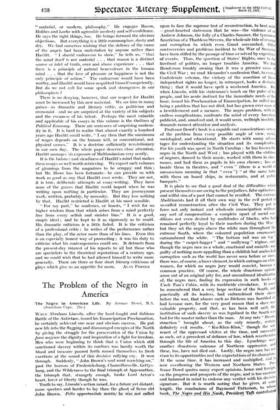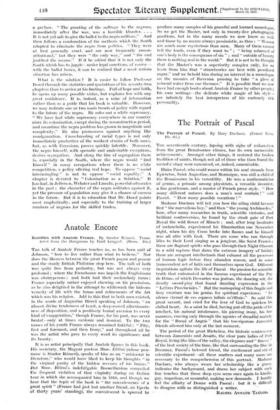The Problem of the Negro in America
The Negro. in American Life. 1337 Jerome Dowd, M.A. (Jonathan ('ape. 2Is.) WHEN Abraham Lincoln, after the hard-fought and dubious Battle of the Antietam, issued his Emancipation Proclamation, he certainly achieved one near and obvious success. He put new life into the flagging and discouraged energies of the North by giving the struggle for the preservation of the Union by force majeure the dignity and inspiration of a fight for freedoni. Men who were beginning to think that a Union which still sanctioned slavery within its confines Was hardly worth the blood and treasure poured forth. roused themselves to fresh exertions at the sound of this decisive' rallying cry. It won through. Suddenly, "John Brown's soul went Marching on," past the horrors of Fredericksburg, Chancellorsville, Gettys- burg, and the Wilderness to the final triumph at Appomattox, the triumph that, strangely enough, broke Lord Acton's heart, lover of liberty though he was.
Truth to say, Lincoln's action raised, for a future yet distant, more spectres and harder to. lay than the ghost of -fierce old John Brown. opportanitate Marlis; -he *Is not Called upon to face the supreme test of reconstruction, -to beat assdo -7-great-hearted statesman that he was—the violence of an
Andrew Johnson, the folly of a Charles Sumner, the tyrannoug fanaticism of-a ThaddeuirStevens, the wholesale tide of revenge and corruption to which even Grant succumbed. Other controversies and problems incident to the War of Secession
have been stilled by the passage of time or solved by experience of events. Thus, the question of States' Rights, once to the
forefront of polities, no longer troubles America. We tibi
Henderson frankly owning that it was a premier cause of the Civil. War ; We read Alexander's confessiOn'that, to event Confederate veteran, the victory of the assertion of those independent rights no longer, in retrospect, looks a desirable thing ; that it would have spelt a weakened America. But when Lincoln, with his statesman's touch on the pulse of his people, and his acute instinct for the immediate needs of the hour, issued his Proclamation of Emancipation, he called into being a problem that has not died, but has grown ever more of a bewilderment and a menace. The negro problem, with its endless complications, confronts the mind of every American publicist, and, unsolved and, it would seem, wellnigh insoluble, demands earnest attention and analysis.
Professor Dowd's book is a capable and conscientious survey of the problem from every possible angle of view, racial,
sociological, and educational. He starts with many advan- tages for understanding the situation and its complexities. For his youth was spent in North Carolina ; he has known the negro in the North and West ; has played with the children of negroes, danced to their music, worked with them in class- rooms, and had theni as pupils in his own classes; has st beside them in theatres, and ' eN:en "'(there is a world of unconscious meaning in that ". even ") "at the sanie table with them on board ships, in restaurants, and at public banquets."
It is plain to see that a good deal of the difficulties which present themselves are owing to the prejudices, false optimisms, and wilful sins of a past that cannot be recalled. The extreme Abolitionists had it all their own lady in the evil period of so-called reconstruction after the Civil War. They put in force not only instant and wholesale emancipation without any sort of compensation—a complete upset of social con- ditions not even desired by multitudes of blacks; who had remained perfectly loyal to their masters during the War-- but they set the negro' above the white man throughout the extreme South, where the coloured population enormously outnumbered the white. "The bottom rail was on lop" during the " carpet-bagger " and " scallywag " regime, and, though the negro race as a whole, emotional and amiable, was guilty of nothing more appalling than a childish but unchecked corruption such as the world has never seen before or since, there was, of course, a baser element, to which outrages on white women, for which no negro jury would convict, became 3 common practice. Of course, the whole disastrous episode arose out of an original pity for, and unconfirmed idealization of, the negro race, finding its expression in such books as Uncle Tom's Cabin, with its worldwide circulation. It mud be remembered that a very large ection of the South, and practically all its leaders, had enfranchised their slave' before the war, that abuses such as Dickens was horrified at had become rare, for the very good reason that a slave wal valuable property, and that, as has been well said, the institution of such slavery as was legalized in the South was had for the master rather thanthe man. At any rate Remo. struction " brought about, as the only remedy, certain definitely evil results. - "Ku-Klux-Klan," though the sole resort of the oppressed whites at the time, and successful as such, set a precedent of defiance of law-, which reverberates through the life of America. to this day. Lynchings were another disastrous outcome of Northern oppression, and these, too, have not died out. Lastly, the negro race has not risen to its opportiinitiesand the expectations Of its champions. At the same time, it has increased and multiplied, and is now overflowing the Western and. Northern- States. l'In- fessor Dowd quotes many expert opinions, home and foreign. on the Progress and prospects of the negro, and is too caution' and balanced in mind to endorse any verdict with his decisive signature. But-it- is worth r noting that he- gives, at some length, the conclusions of RaymonePatterson, to win"' book,_ The Negri?. and His Needs, President Taft contributed
a preface. "The granting of the suffrage to the negroes, immediately after the war, was a horrible blunder. . . . It is not yet safe to give the ballot to the negro millions." And then follows a condonation of the methods which the South adopted to eliminate the negro from politics. "They were at first generally cruel, and are now frequently uncon- stitutional," but they were "the only way," and " the end justified the means." If it be added that it is not only the South which has to juggle—under legal sanctions, of course— with the ballot boxes, it can be realized that a most serious situation has arisen.
What is the solution ? It is easier to follow Professor Dowd through the statistics and quotations of his seventy-two chapters than to arrive at his findings. Full of hope and faith, he opens up many possible vistas, but explores few with any great confidence. It is, indeed, as a mine of information rather than as a guide that his book is valuable. However, we may indicate one or two main trends of policy with regard to the future of the negro. He rules out a white supremacy. "We have had white supremacy everywhere in our country since its colonization, except during the reconstruction period, and meantime the negro problem has grown in magnitude and complexity." He also pronounces against anything like amalgamation. Cross-breeding of racial types is not only irnmediately productive of the weakest strains of both races, but, as with Eurasians, proves quickly infertile. Moreover, the negro himself, with sporadic and undesirable exceptions, desires segregation. And along the line of segregation there is, especially in the South, where the negro would "find himself" in many occupations where there is no white competition, a policy offering real hope. To oppose "social intermingling" is not to oppose "social equality." A chapter is devoted to "Colonization as a Solution." It has had, in Jefferson, Webster and Lincoln, powerful advocates in the past ; the character of the negro militates against it, yet the pressure of population may give it a chance of success in the future. But it is to education that Mr. Dowd points most emphatically, and especially to the training of larger numbers of negroes for the skilled trades.































































 Previous page
Previous page